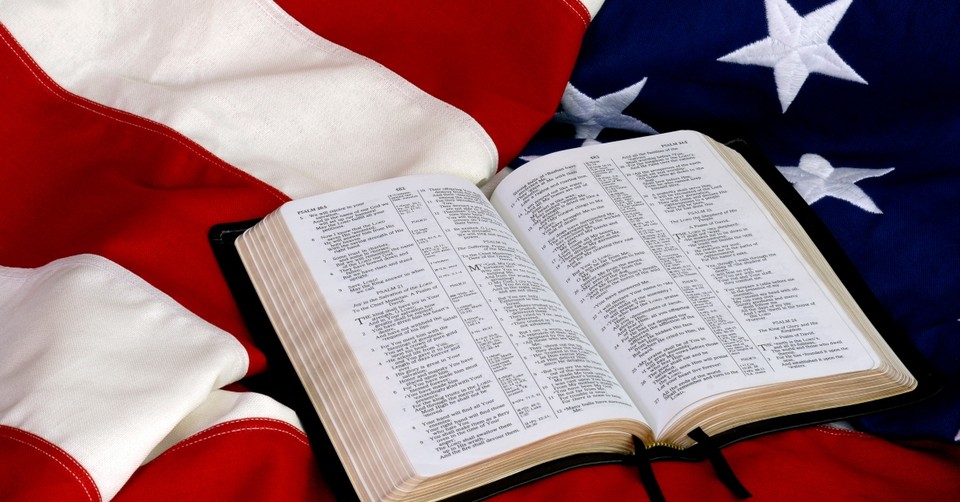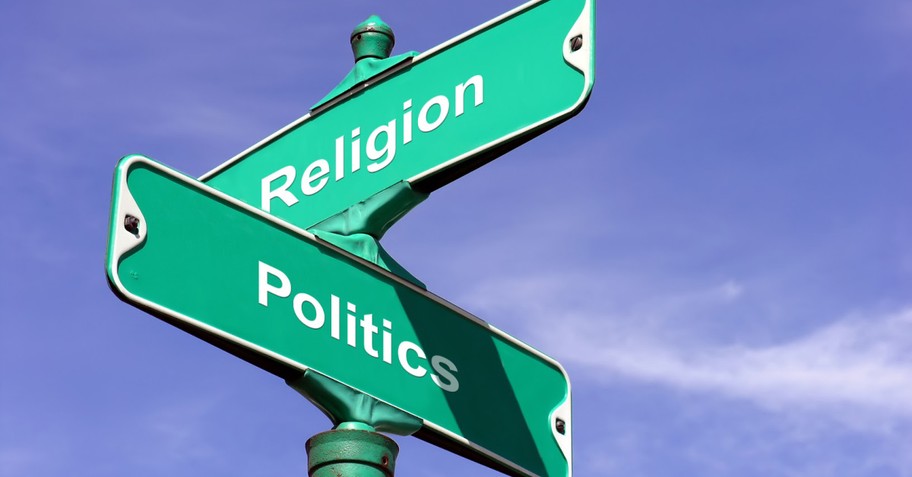How to Be Careful about Politicizing Your Spirituality

The “political stumping” pastor runs the risk of alienating half his audience by focusing on politics over people. Admittedly, I often boast following a Volunteers win over Kentucky or an extended winning streak of the Atlanta Braves despite the opposition’s presence in the pews. They know that my high-pitched tone will be short-lived after the inevitable big loss.
Sunday morning pastors have the challenging task of eliciting a response from a congregation of mixed loyalties, ages, and circumstances. He wants to preach the gospel but often must connect that gospel to culture and contemporary issues. With that connection, however, inevitably comes political parties or candidates and their respective social issues. Those issues – such as same-sex marriage, legalization of drugs, gun control, and abortion – often birth division within a church body. The pastor will often attach stances to the issues of one party or another. However, no one appreciates being “force-fed” politics.
Photo Credit: ©Getty Images/lawcain
Politics Sow Seeds of Division
When a pastor strays far from the gospel to take a hardline stance on politically charged issues, he runs the risk of driving division in the congregation with his own two hands. I might agree with our right to bear arms, but if I preach a sermon series on “Assault Rifles, by God,” I end up alienating (and possibly hurting) those who have suffered from gun violence. And even if my congregation agrees with my stance against abortion, drugs, or same-sex arrangements, they might instantly tune out if I force-fed them a specific candidate or party. Jesus, when meeting the Samarian woman at the well (John 4:7-29), initiated the dialogue by requesting a drink and explaining the living water from the gift of God. He did not introduce himself as the Savior of the world and rebuke her for divorces or current adulterous relationships out of the gate.
Our Gospel Story Unites
Our ministry focus tells a story about something more beautiful than he or she has ever heard or experienced without dependence on a popular or electoral vote. Altered behavior through the grace of God and the power of the Holy Spirit portrays the beauty of the gospel. Thus, when a person’s perspective changes, he or she makes decisions corresponding to that viewpoint – even voting. The person’s convictions on sinful behaviors or lifestyles dictate their political choices more so than merely advocating for a party or candidate.

Stability of the Message
Christ entrusted and commissioned the spiritual elect to share the political-proof gospel untethered to shifting cultures. The legality of abortion or same-sex marriage, while important issues, do nothing to curb the behavior of the lost individual contemplating ending a pregnancy or living with a same-sex partner. As such, the seating of a candidate, whether conservative or liberal, does little to provoke or alter an individual’s opinion of this behavior.
The beauty of the gospel is the stability of reconciliation from “by grace, through faith in Jesus Christ.” Politics do not fit into this box, identifying one as either lost or saved. The subtle inclusion of progressive measures “leavens” otherwise holy legislation. As a result, one can identify as a Democrat and not agree with the party’s social stances. Thus, Republicans can disagree with the party’s weaknesses in addressing biblical stances. However, if I label and promote my church with a political affiliation, rest assured that those on the fringe will not visit my church, irrespective of its orthodoxy.
Stability of Our Story
The gospel never changes despite the morphing and supposed advancement of a particular culture. The Egyptian culture and hierarchy, which grew to accept and appreciate Joseph and his family, transitioned into a regime that “knew not Joseph” when “there arose up a new king over Egypt.” Cultural change does not happen today or tomorrow. Consider the length of time between Pentecost and the acceptance of Christianity under Constantine. The political machine did not cause this cultural and political change, but from a grassroots effort of “no names” sprouting from a “Victory in Jesus” refrain. Further, Nebuchadnezzar understood the commitment necessary to indoctrinate Daniel, Hananiah, Mishael, and Azariah. In addition to changing their names and desire to teach them “the tongue of the Chaldeans,” the king planned to feed them the king’s meat and wine as a three-year diet plan. We cannot allow the world to identify us primarily with a political party and feed the church a worldly diet in a desire for us to forsake our commitment to Christ for promised national change.
Photo Credit: ©Getty Images/Josearba
Our Affiliation
My staunchly Democrat grandparents donned their blue because of the party’s platform for blue-collar workers in my hometown’s coal mines. They never had anything positive to say about the other party. They saw Republicans as the enemy irrespective of whether the candidate coached an elementary basketball team or volunteered to pick up roadside trash. He or she remained a flawed Republican. This generational identity continued despite a gradual transformation from within the party due to shifting social stances.
Advocating a political party or politician is a losing proposition longitudinally. Our country has elected a president from the party of the preceding president only three times since 1953. Further, the party of our President rarely enjoys majority control of both the Senate and Congress. Our political system, structured toward diverse and staggered control, prevents too much control or power by a single party. For example, the Supreme Court decided Roe vs. Wade in 1973 when Republican Richard Nixon resided in the White House. Same-sex marriage was legalized under the presidency of Barack Obama, despite Mitch McConnell heading the Senate with a Republican majority. The checks and balances intended by our forefathers prevent the isolation of power. As Andy Crouch identified in his book “Culture Making,” Jesus had an uncanny ability to bridge the political elites and the powerless outcast. If we succumb to a political alliance, we position our leverage toward the power of a candidate or party. Our credibility then rests upon a November result.
The media reminds us each November that “elections have consequences.” As such, an allegiance to the fallible candidate has consequences as well. Personal failures in marriage, parenting, and/or invisible dedication to the orthodox faith reflect the flaws of every candidate. Both major candidates in 2020 and 2024 are personally, if not spiritually, flawed. We risk advocating such behavior when we stump for the sinful saint based on party allegiance.
The church should be involved and participate in the election process by voting, yes. However, a pastor holds a captive audience needing a message of hope that never has nor ever will come from an election result. Regardless of who wins the White House this November, Jesus commissioned the church to preach and teach the gospel to a dark and confused world. Cultural and political change that reflects the gospel occurs at a snail’s pace because gospel change originates at a personal level.

Our Story Promotes Cultural Engagement
Instead of looking forward to the hopes of the next election, our cultural position requires adaptation and cultivation within the current political stage. We are present in this season for a purpose. The believer’s desire for social change and political shifts originates within the people. Daniel, while living under the regime of Nebuchadnezzar, peacefully protested the king’s commands and, as a result, revealed the power of his mighty God. Similarly, the apostles following Pentecost turned “the world upside down” by working within the parameters of their local governments instead of advocating immediate insurrection against Roman leadership.
Seek People over Politics
A focus on the policy more than the people behind the policy identifies the cause for Christ. In His Sermon on the Mount, Jesus went a step beyond the law, or “policy,” by advocating the expected treatment of the neighbor. Our culture erroneously equates legal behavior with spirituality. Jesus promised a blessing to those who are poor spirit, mournful, meek, hungry and thirsty for righteousness, merciful, pure in heart, peacemakers, and those persecuted for the sake of righteousness. This obedience represented action over and above the Mosaic law.
Our legislative branch enacts laws that may or may not agree with the believer’s scriptural mandate. Our churches preach against blanket divorce, abortion, and same-sex marriage even though the law of our land permits participation in these practices. By revealing that a person is guilty of fornication or adultery without seeing the flesh of the intended target, Jesus pointed to our depravity and heart condition. While we should be law-abiding citizens, we cannot allow the legality of our actions solely to justify our position or actions. As a result, politicians take the advocating pastor hostage when he or she changes a position at the behest of a PAC or lobbyist.
Photo Credit: ©Getty Images/J.S. Winborne
Usefulness of Historical Guides
Augustine, in “City of God,” described a sovereign God who installs nations and people by His power and for His purpose. The nation or person falls or disappears following the completion and realization of His purpose. God knows the necessary components and actions to complete this purpose. The electing of a progressive left-wing candidate does not represent God’s failure or even our failure as a culture. Without Nebuchadnezzar, Daniel would have missed an opportunity to show off his God. The church has an opportunity to grow stronger under godly presidents and representatives, but the historical evidence does not indicate we take advantage of our freedom.
Constantine, in his promotion of Christianity, urged believers to create art reflecting religion and Christ. However, this led to disruption and schism within the church over whether these icons or art exhibits amounted to idol worship. The church does not always prosper with worldly liberty. Paul prayed for the removal of his hindrance. In God’s denial of this request, Paul learned the sheer power and sufficiency of God’s grace. President Trump allowed mandates to shut down churches during the COVID-19 pandemic. Soon thereafter, the government prohibited congregational singing under President Biden. Even after the removal now of these governmental barriers, many Christians have yet to return to the church building. Samuel Johnson wrote, “Prosperity, unalloyed and imperfect as it is, has power to intoxicate the imagination, to fix the mind on the present scene, to produce confidence and elation and to make him who enjoys affluence and honors forget the hand by which they were bestowed.” Adversity allows the church to show its power. However, our reactions often say more about us than our politics.
RELATED PODCAST:
Disclaimer: The views and opinions expressed in this podcast are those of the speakers and do not necessarily reflect the views or positions of Crosswalk.
Originally published February 17, 2025.






